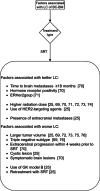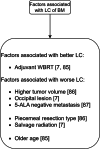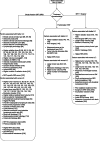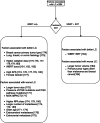Factors associated with the local control of brain metastases: a systematic search and machine learning application
- PMID: 38907265
- PMCID: PMC11191176
- DOI: 10.1186/s12911-024-02579-z
Factors associated with the local control of brain metastases: a systematic search and machine learning application
Abstract
Background: Enhancing Local Control (LC) of brain metastases is pivotal for improving overall survival, which makes the prediction of local treatment failure a crucial aspect of treatment planning. Understanding the factors that influence LC of brain metastases is imperative for optimizing treatment strategies and subsequently extending overall survival. Machine learning algorithms may help to identify factors that predict outcomes.
Methods: This paper systematically reviews these factors associated with LC to select candidate predictor features for a practical application of predictive modeling. A systematic literature search was conducted to identify studies in which the LC of brain metastases is assessed for adult patients. EMBASE, PubMed, Web-of-Science, and the Cochrane Database were searched up to December 24, 2020. All studies investigating the LC of brain metastases as one of the endpoints were included, regardless of primary tumor type or treatment type. We first grouped studies based on primary tumor types resulting in lung, breast, and melanoma groups. Studies that did not focus on a specific primary cancer type were grouped based on treatment types resulting in surgery, SRT, and whole-brain radiotherapy groups. For each group, significant factors associated with LC were identified and discussed. As a second project, we assessed the practical importance of selected features in predicting LC after Stereotactic Radiotherapy (SRT) with a Random Forest machine learning model. Accuracy and Area Under the Curve (AUC) of the Random Forest model, trained with the list of factors that were found to be associated with LC for the SRT treatment group, were reported.
Results: The systematic literature search identified 6270 unique records. After screening titles and abstracts, 410 full texts were considered, and ultimately 159 studies were included for review. Most of the studies focused on the LC of the brain metastases for a specific primary tumor type or after a specific treatment type. Higher SRT radiation dose was found to be associated with better LC in lung cancer, breast cancer, and melanoma groups. Also, a higher dose was associated with better LC in the SRT group, while higher tumor volume was associated with worse LC in this group. The Random Forest model predicted the LC of brain metastases with an accuracy of 80% and an AUC of 0.84.
Conclusion: This paper thoroughly examines factors associated with LC in brain metastases and highlights the translational value of our findings for selecting variables to predict LC in a sample of patients who underwent SRT. The prediction model holds great promise for clinicians, offering a valuable tool to predict personalized treatment outcomes and foresee the impact of changes in treatment characteristics such as radiation dose.
Keywords: Brain metastases; Local control; Local control factors; SRT dose; Tumor volume.
© 2024. The Author(s).
Conflict of interest statement
The authors declare no competing interests.
Figures









Similar articles
-
Toxicity and time lapse between immunotherapy and stereotactic radiotherapy of brain metastases.Cancer Radiother. 2021 Jul;25(5):432-440. doi: 10.1016/j.canrad.2021.01.007. Epub 2021 Apr 6. Cancer Radiother. 2021. PMID: 33836954
-
Machine learning approaches for prediction of early death among lung cancer patients with bone metastases using routine clinical characteristics: An analysis of 19,887 patients.Front Public Health. 2022 Oct 6;10:1019168. doi: 10.3389/fpubh.2022.1019168. eCollection 2022. Front Public Health. 2022. PMID: 36276398 Free PMC article.
-
Combined Immunotherapy and Stereotactic Radiotherapy Improves Neurologic Outcomes in Patients with Non-small-cell Lung Cancer Brain Metastases.Clin Lung Cancer. 2021 Mar;22(2):110-119. doi: 10.1016/j.cllc.2020.10.014. Epub 2020 Nov 10. Clin Lung Cancer. 2021. PMID: 33281062
-
Stereotactic Radiosurgery for Postoperative Metastatic Surgical Cavities: A Critical Review and International Stereotactic Radiosurgery Society (ISRS) Practice Guidelines.Int J Radiat Oncol Biol Phys. 2021 Sep 1;111(1):68-80. doi: 10.1016/j.ijrobp.2021.04.016. Epub 2021 Apr 20. Int J Radiat Oncol Biol Phys. 2021. PMID: 33891979 Review.
-
Data-driven modeling and prediction of blood glucose dynamics: Machine learning applications in type 1 diabetes.Artif Intell Med. 2019 Jul;98:109-134. doi: 10.1016/j.artmed.2019.07.007. Epub 2019 Jul 26. Artif Intell Med. 2019. PMID: 31383477 Review.
Cited by
-
Predictive modeling for metastasis in oncology: current methods and future directions.Ann Med Surg (Lond). 2025 May 21;87(6):3489-3508. doi: 10.1097/MS9.0000000000003279. eCollection 2025 Jun. Ann Med Surg (Lond). 2025. PMID: 40486555 Free PMC article. Review.
References
-
- Donofrio CA, Cavalli A, Gemma M, Riccio L, Donofrio A, Panni P, et al. Cumulative intracranial tumour volume prognostic assessment: a new predicting score index for patients with brain metastases treated by stereotactic radiosurgery. Clin Exp Metastasis. 2020;37:499–508. doi: 10.1007/s10585-020-10037-z. - DOI - PubMed
-
- Achrol AS, Rennert RC, Anders C, Soffietti R, Ahluwalia MS, Nayak L, et al. Brain metastases. Nat Reviews Disease Primers. 2019;5. - PubMed
Publication types
MeSH terms
LinkOut - more resources
Full Text Sources
Medical
Research Materials

